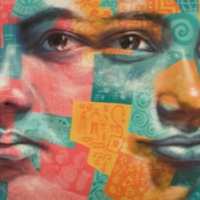
I left Eritrea in 1990. Then I worked in Gedaref, Sudan. I never thought of going to Europe. It didn’t matter where I worked, as long as I got money. People can be misleading. I went to Libya with a friend. A Sudanese guy I worked with told me of the job opportunities there. We traveled in a Toyota pickup trick. We were 34 people squeezed into one vehicle.
We were handed over to the Libyan smugglers and imprisoned. The problems started in the store they kept us in. It was very hot, and no one would listen to us. They beat us. We were kept there [in Tripoli] for two months. The water had worms in it. We had to filter it with our clothes to drink it.
My sea journey was difficult. I don’t remember anything past the first 24 hours. Our boat journey was bad. It was crowded and we couldn’t move. We were afraid it would sink. After travelling 24 hours, the rescue ship came around 3 am. I don’t exactly remember if that was the moment I got sick. An Ethiopian lady sitting beside me asked why I wasn’t praying. I told her that prayers can also be made by the heart. She laughed and cried at the same time.
I don’t know how many days we traveled or what happened. I didn’t find anyone from the journey I could ask. I was admitted to a hospital in Italy, thanks to the Italians who accepted me. I was hospitalized for three months and received different treatments. After I regained consciousness, I called my brother. My brother and family members cried when I called them. I didn't know if I was alive or dead. I didn’t know if the people around me were Arabs or Europeans. I didn’t know I was in Europe.
[…]
After three or four days I met a Somali who spoke Arabic. I told him about my problems. I said I was sick and I didn’t know where my friends were. He introduced me to the doctors, and they were very helpful. But I lost all my belongings. I had a bag with my clothes and friends’ telephone numbers. I don’t know if it sank in the sea or got lost afterwards.
After I got better, I couldn’t find a job in Italy. Then I made friends with an Italian who I'd met in the hospital. I asked him for advice. I said I didn’t want to live in Italy because I needed medical treatment. We used a translator over the telephone because I didn’t know his language. I asked him to direct me to a country he thought suitable for me. He asked me which country I'd prefer. I said Sweden. He told me Sweden is good for making money. But medical treatment is better in Germany.
I asked if he’d help me leave the hospital. He agreed and took me to a train leaving for Milan at 8pm. On October 11, I came here [to Munich] and went to the police. I was taken into custody later that day. My fingerprints were taken on October 15, four days after my arrival. I expected to get treatment right away afterwards, but I didn’t. I wasn’t able to talk. Even now, I cannot speak properly. They asked me why I was crying. I was just talking, but it looked like I was crying.
Thank God I am better now. The Germans worked hard to treat me. My legs were paralyzed. Even now I cannot walk properly. When I stand up, I get dizzy. My eyes hurt and I can’t read or recognize telephone numbers. I started this journey without a plan. Young Eritreans who’d been with me in Libya perished at sea in April. They left one year after I did.
Narrative produced by Telling the Real Story, an initiative facilitated by UNHCR The UN Refugee Agency
Original narrative can be found at









